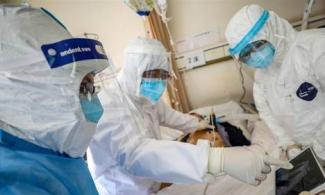
The countries listed have a UHC Service Coverage Index that is lower than 50 and a density of doctors, nurses and midwives that is below the global median (48.6 per 10,000 population).
Nigeria, Afghanistan, Angola, Bangladesh, Cameroon, Central African Republic are among 54 countries the United Kingdom has listed that should not be actively targeted for recruitment by health and social care employers.
This comes amid a public outcry about brain drain in Nigeria's health institutions as several medical doctors and other health workers have migrated to the UK and other parts of the world in search of better jobs rather than practising at home.
Meanwhile, Nigerian are already pushing for a mandatory five-year national service for doctors.
The UK government announcement is contained in its revised code of practice for the international recruitment of health and social care personnel in England which was published on NHS Employers website.
The Code of Practice for International Recruitment states that some developing countries such as Nigeria should not be targeted when actively recruiting health or care professionals.
The countries placed on the red list of ‘No active recruitment’ in alphabetical order are Afghanistan, Angola, Bangladesh, Benin, Burkina Faso, Burundi, Cameroon, Central African Republic, Chad, Comoros, Congo, Democratic Republic of Congo, Côte d’Ivoire, Djibouti, Equatorial Guinea, Eritrea, Ethiopia, Gabon, The Gambia, Ghana, Guinea, Guinea-Bissau, Haiti, Kiribati, Lao People’s Democratic Republic, Lesotho, Liberia.
Other countries are Madagascar, Malawi, Mali, Mauritania, Federated States of Micronesia, Mozambique, Niger, Nigeria, Pakistan, Papua New Guinea, Rwanda, Samoa, Senegal, Sierra Leone, Solomon Islands, Somalia, South Sudan, Sudan, United Republic of Tanzania, Timor-Leste, Togo, Tuvalu, Uganda, Vanuatu, Republic of Yemen, Zambia, and Zimbabwe.
Titled: "Code of Practice red and amber list of countries," the UK Government said the list is based upon the World Health Organisation Workforce Support and Safeguard List, 2023 and will be updated alongside progress reports on WHO Global Code implementation and reported to the World Health Assembly every three years.
The countries listed have a UHC Service Coverage Index that is lower than 50 and a density of doctors, nurses and midwives that is below the global median (48.6 per 10,000 population).
The list the code stated doesn’t prevent individual health and social care personnel from independently applying to health and social care employers for employment in the UK, of their own accord and without being targeted by a third party, such as a recruitment agency or employer (known as a direct application).
It defined active international recruitment in the code as the process by which UK health and social care employers (including local authorities), contracting bodies, recruitment organisations, agencies, collaborations, and sub-contractors target individuals to market UK employment opportunities, with the intention of recruiting to a role in the UK health or social care sector. It includes both physical or virtual targeting, and whether or not these actions lead to substantive employment.
The code of practice applies to the appointment of all international health and social care personnel in the UK, including all permanent, temporary, and locum staff in clinical and non-clinical settings.
This includes but is not limited to allied health professionals, care workers, dentists, doctors, healthcare scientists, medical staff, midwives, nursing staff, residential and domiciliary care workers, social workers, and support staff.
In 2021, the UK suspended the recruitment of healthcare workers from Nigeria and 46 other countries, noting that the increasing scale of health and social care worker migration from low and lower-middle-income countries threatens the achievement of their nation’s health and social care goals.
The WHO on March 8, 2023, listed Nigeria and other 54 countries as facing the most pressing health workforce challenges related to universal health coverage.